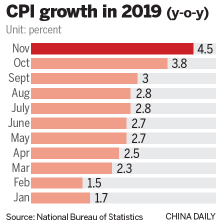CPI hits year's high point
By Xin Zhiming and Zhou Lanxu (China Daily) Updated: 2019-12-11 00:00China's consumer price index, a main gauge of inflation, rose 4.5 percent year-on-year in November, the highest monthly figure for the year, the National Bureau of Statistics said on Tuesday.
Analysts said the index may remain at high levels in the first half of next year, but fall in the second half in comparison with relatively high figures this year.
Rising consumer inflation is expected to alert macroeconomic policymakers, but it should not distract their focus on preventing deceleration of growth at this year's Central Economic Work Conference, which is expected to convene this week, economists said.
Food prices grew last month by 19.1 percent year-on-year, compared with 15.5 percent in October, while nonfood prices gained 1 percent, 0.1 percentage point higher than that of October.
Pork prices rose last month by 110.2 percent year-on-year, becoming the main driving force for rising CPI.
In the first 11 months of the year, consumer prices rose by 2.8 percent on average from a year earlier, the bureau said.
"The CPI surge is not surprising," said Yu Yongding, an economist at the Chinese Academy of Social Sciences and a former member of the central bank's monetary policy committee. "It is mainly driven by pork price rises, and core inflation excluding highly volatile food and energy prices remains mild."
Since inflation was mainly triggered by a single factor, pork prices, it is unnecessary for China to tighten monetary policy because it won't help dampen pork prices, said Niu Li, deputy director of the forecasting department at the State Information Center.
The price rises should not affect China's monetary policy stance, and there's still room for strengthening countercyclical regulation to boost growth, he said, predicting that this year's CPI growth may reach 2.9 percent, slightly lower than the 3 percent inflation control target for the year.
China's growth may need to be around 6 percent next year to achieve its goal of doubling its 2010 GDP by 2020, Niu said. "There's still some room for China to take countercyclical measures to stabilize growth," he said.
Zhang Ye, founding partner of Cyanhill Capital, a Chinese early-stage venture capital firm, said China has ample policy reserves to achieve its growth and price control targets.
"To boost growth, for example, China can further encourage consumption, build a favorable environment for investors and promote innovation-driven, high-quality development," he said.
The Central Economic Work Conference this week is expected to set a tone for next year's economic work agenda.
"We expected policymakers at the meeting to become more tolerant toward downside growth pressure," said Cheng Shi, managing director and chief economist at ICBC International Holdings.
"Policymakers may allow the country's GDP growth to dip below 6 percent in certain quarters next year, though the whole year's growth should be maintained at around 6 percent," he said. "They would strike a balance between growth stabilization and price stabilization."
Ouyang Shijia contributed to this story.

- 'Cooperation is complementary'
- Worldwide manhunt nets 50th fugitive
- China-Japan meet seeks cooperation
- Agency ensuring natural gas supply
- Global manhunt sees China catch its 50th fugitive
- Call for 'Red Boat Spirit' a noble goal, official says
- China 'open to world' of foreign talent
- Free trade studies agreed on as Li meets with Canadian PM Trudeau
- Emojis on austerity rules from top anti-graft authority go viral
- Xi: All aboard internet express











